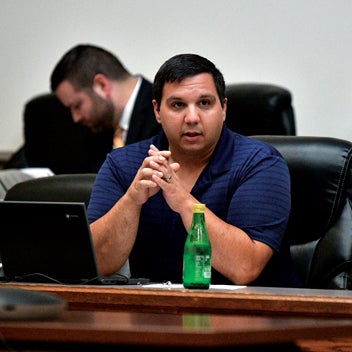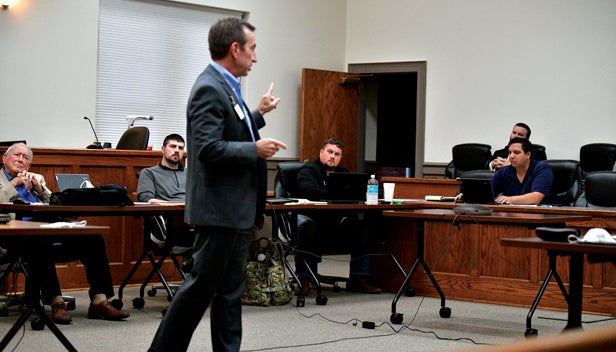EMS director: Staffing shortage causes delays
Published 5:22 pm Wednesday, October 6, 2021
|
Getting your Trinity Audio player ready...
|
Committees talk response issues, rural broadband and more
BY IVAN SANDERS
STAR STAFF
ivan.sanders@elizabethton.com
A lack of staff is causing delayed EMS response times throughout Carter County, a local official said Tuesday.
Rescue Squad Director Terry Arnold talked with members of the Carter County Commission during committee meetings this week, offer an explanation for increasing complaints about response times for EMS service.
Arnold told the committee that the main problem is getting people to work.
“We usually run around 62 people (on staff), but right now we are at 32 which allows us to run only two to three trucks a day,” Arnold said.
With nearly 57,000 residents in Carter County, the EMS service should run five to six trucks per day. “There should be a truck for every 10,000 people,” Arnold said.
Arnold said finding staff is “a big concern.”
“We have put out national and local ads even reaching Alaska, but you wouldn’t believe what comes in,” he said. “This is the worst that I have seen and I have been here over 40 years.”
Arnold asked committee members to share any ideas or suggestions on how to address the issue.
In other business on Tuesday, committees heard reports on several key issues, including:
• Rural Broadband efforts. Emily You, the Broadband Grants Manager for Tennessee Economic and Community Development, spoke with members of the Health and Welfare committee about the application process for broadband access grants. Gov. Bill Lee will open the application process on Jan. 3, 2022, for the $500 million ARP grants that will help underserved counties, like Carter County, get broadband access. Dr. Robert Acuff said the committee has been working with Sky Best to complete the grant process. The writing of a request for proposal by a third party is one of the major steps remaining. Since the amount of the grant will exceed $500,000, a third-party grant writer will be required. “We see no red flags in what (You) shared,” said Edward Hinson of Sky Best.
• Efforts to evaluate the impact of the 2020 Census on the commission makeup and districts. Workshops will be held on Oct. 14, 19, and 25 at 6 p.m., with video access potentially available to the public. During those workshops, each district will be evaluated in regard to the deviation in population numbers received from the Census Bureau. The committee also will be charged with presenting whether the number of commissioners should be decreased or remain the same. Randall Jenkins, Rules and Bylaws committee chairman, said the commission has twice voted down changing its size during the past eight years, saying the timing was not right. Jenkins said the timing may now be right for a change, and the committee will make its recommendations to the full commission in November. “If county residents feel that the commission needs to be reduced, they need to speak to their commissioners and let their voice be heard,” Jenkins said after the meeting.
• A program to help develop rural primary care physicians. “For communities to thrive they have to have good primary care physicians as every physician equates to about $1 million,” said Dr. Tom Kincer, Associate Dean for Rural and Community Programs at East Tennessee State University – Quillen College of Medicine. “The question is how can we increase primary care physicians in the community?” Kincer is working to introduce EQUIP (Extending Quillen to the Underserved through an Integrated Pipeline). The program is designed to identify and mentor students from rural and underserved areas who are interested in attending East Tennessee State University – Quillen College of Medicine. It would accept students in their final two years of high school and throughout college, enhancing the student’s ability to successfully navigate the education, activities, testing, and application process necessary for medical school admission. Kincer and his team are working through the finalization of the project and are reaching out to attempt to create partnerships with rural communities going forward.
• Statewide interest in the CTE Centralization Project. “This is a pivotal moment for Carter County as there is a lot of talk about what is happening in Carter County,” said Mayor Patty Woodby. “Senators Rusty Crowe and Jon Lundberg will be introducing a capital outlay budget for $20 million which is what the architects feel it will take to complete the project.” Committee Chairman Daniel McInturff agreed. “They are very excited in Nashville. Foresight was the word they used. This is putting us on the map, and when and if we do this, it’s something that young adults can hang their hats on. They will be walking out of high school and going straight to work. We need to start pushing to hire locally and get back to taking care of our own.
• Delays in building and repair projects due to the inability to get supplies.
• Committee leadership positions. Committee leaders selected include Buildings and Grounds, Daniel McInturff, chairman, and Isaiah Grindstaff, vice chairman; Health and Welfare, Dr. Robert Acuff, chairman, and Mike Miller, vice chairman; Rules and Bylaws, Randall Jenkins, chairman, and Layla Ward, vice chairman; and Law Enforcement, Thomas Proffitt, chairman, and Layla Ward, vice chairman.





